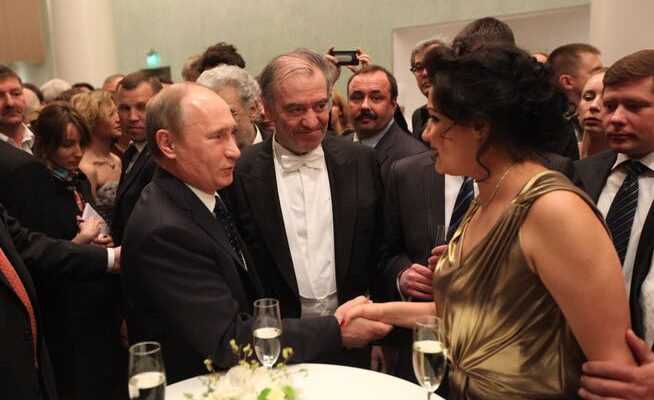Since the beginning of the war in Ukraine, suspicion of Russian artists has been growing in the West. Valery Gergiev and Anna Netrebko, who are being punished for being close to Putin, are no longer the only ones affected. Where is this supposed to lead?
Vladimir Putin, Valery Gergiev and Anna Netrebko in May 2013 at the reopening of the Mariinsky Theater in St. Petersburg.
The world of culture is at a turning point. With the beginning of the Russian war of aggression, the long-established laissez-faire in the music and event industry came to an end. So far, when it comes to engagements by artists, it has hardly ever played a role in what relationship they had to those in power and their politics in their home country. This has fundamentally changed over the past week: Since then, Russian musicians who have appeared as partisans of Vladimir Putin or who are suspected of being close to the state have been under considerable pressure to justify themselves. Individuals even face the end of their careers on western stages.
The conductor Valery Gergiev and the star soprano Anna Netrebko have felt this since Friday. Because they didn’t want to comment at all (Gergiev) or only ambiguously (Netrebko) on the war activities of Putin, their most important sponsor, both are currently losing their engagements and performance opportunities in many places, for example in New York and Munich, as well as in Lucerne, Verbier and Zurich. The organizers are also reacting to earlier border crossings, such as Netrebko’s publicly effective visit to the separatists in eastern Ukraine in 2014 or Gergiev’s support for the Crimean annexation.
You could always have found this strange and sanctioned accordingly. Instead, they preferred to refer to the supposedly outstanding importance of the two as artists and turned a blind eye. It is a moral reflex that Gergiev and Netrebko, as well as a number of other, less exposed Putin supporters, should now pay for their partisanship. It’s late, but it’s correct. Something else seems questionable.
The West’s return to its values and the principles of international law will in future force every artist with a Russian passport to take a political oath of disclosure. Celebrities such as the chief conductor of the Berlin Philharmonic, Kirill Petrenko, or Vladimir Jurowski, the general music director of the Bavarian State Opera, have already done so and have not just paid lip service to distancing themselves from Putin and his warmongering. A striking number of them have long been living temporarily or permanently in the West, quite a few in Switzerland.
Provided that the current rigorism in the music world continues, the only alternative left for artists close to the state in Russia is to end their careers in the West or go into exile. Can a free world confront people with such an existential alternative? The question is far more difficult to answer morally. Public confessions against the war are easy to demand as long as one does not have to bear the personal consequences under an unjust regime.
Added to this are the gray areas that can be found – or can be found – in every biography, no matter how flawless. Which authority then decides who is “close to the state” and who is “harmless”? Hardly the currently particularly hyped-up attitude police on the Internet. There are already first cases in the music world in which entire institutions or ensembles are collectively pilloried simply because they have the wrong director or a financier who is allegedly close to Putin.
Do we have to recall the black lists of the American McCarthy era in order to see where, in extreme cases, attitude tests can lead? We haven’t gotten that far yet, but suspicion has long been spreading in parallel with the escalation of the war and is no longer directed only at well-known Putin supporters such as Gergiev and Netrebko. As a consequence, musical life is threatened with an unprecedented bloodletting. But a morally clean cultural world would not be gained by this. She has always been an illusion.
